The
visit to this Sri Banapureeswarar Temple was a part of the “Shiva, Vishnu and
Amman Temples Visit, in and around Kumbakonam”, on 13th July 2024. This place was called Somanatha Mangalam during Kulothunga Chozha-III's period. Sri Somanatha Swamy is now called Sri Banapureeswarar. This
temple is one (Vayu) of the Pancha Bhuta Temples of Kumbakonam.
Moolavar : Sri Somanatha Swamy, Sri
Banapureeswarar
Consort : Sri Somakalambal, Sri Abirami
Some
of the salient features of this temple are….
The
temple faces east with a 3-tier Rajagopuram. Balipeedam, Dwajasthamabam,
and Rishabam are after the Rajagopuram under a metacolour Sheet mandapam. Vinayagar,
Murugan, and Dwarapalakas are on both sides of the entrance to the sanctum
sanctorum. A Balipeedam and Rishabam are in front of the sanctum sanctorum. Moolavar
Sri Banapureeswarar is on a round avudaiyar. In Koshtam, Vinayagar,
Dakshinamurthy, Rishabanthigar, along with Ambal. Brahma and Durgai.
In the praharam, Vinayagar, Shiva Lingam, Sri Valli Devasena Subramanian, Maha Lakshmi,
Anjaneyar, Durgai, in a separate sannidhi with stucco dwarapalakas,
Chandikeswarar, Bairavar, Suriyan, and Navagrahas.
Ambal
is in a separate sannidhi facing South. Ambal is in a standing posture with
abhaya varada hastam.
ARCHITECTURE
The
temple consists of the sanctum sanctorum, antarala, ardha mandapam, and a mukha
mandapam. The sanctum sanctorum is on a prati bandha adhistanam with padma
jagathy, vrudha kumudam, kapotam, and viyyalavari. The bhitti starts with vedikai.
The pilasters are Brahmakantha pilasters with square bases, kalasam, kudam,
lotus petals mandi, palakai, and poomottu pothyal. The prastaram consists of
valapi, kapotam with nasikudus, and viyyalavari. The temple was constructed with
stone from adhistanam to prastaram with stone. The superstructure, ie, vimana, was constructed with bricks. The vimanam is of one tala, greevam, and vesara
sigaram. Stucco images of Shiva, Dakshinamurthy, Maha Vishnu, and Brahma are in
the Tala and greeva kostams. Maha Vishnu and Brahma are with their consorts. In
addition, stucco images of Nandhi Devar and other deities.
The
Deva koshtas are padra Koshtas and Sala style. Kumbha panjaras are in aharai,
between sala paththi and Karnapaththi, and outside the wall of the antarala.
HISTORY
AND INSCRIPTIONS
The
temple belongs to Kulothunga Chozha III. Inscriptions are found on the
adhistanam. Later reconstructed and expanded during the Vijayanagara Nayakas /
Marathas.
As per Dr. Nagasamy, the temple was built on a Nandhavana land belonging to the Darasuram Sri Iravateeswarar Temple. As per the request of Sathuranana Pandithar, the Anmeega Guru of Kulothunga Chozha directed his Chieftain to build this temple.
மூன்றாம் குலோத்துங்கனின் 9 ஆவது
ஆட்சியாண்டு (1227 பொயு), மகாமண்டபம் வடபுறப்பட்டி – தென்புற ஜகதியில் உள்ள கல்வெட்டு,
கங்கை கொண்டான் ராஜராஜதேவனான அணுக்கப்பல்லவரையன், கங்கை கொண்டான் பெற்றாழ்வான், மற்றும் கங்கை கொண்டான் பெரியான் ஆகிய மூவரும், ஒரு குறிப்பிட்ட வாணகோவரையர்க்கு தம்
வாழைப்பந்தல் நிலத்தினை எண்ணாயிரம் காசுகளுக்கு விற்றுக் குடுத்தமையைக்
குறிக்கின்ற ஆவணம் இது. முன்னரே, இவர்களுடைய சிற்றப்பனார்
பெரியான் கூத்தரான செங்கீரையார் முதலில் பெற்றிருந்த நிலம் ஐந்து வேலியும்,
இதே வாணகோவரையர்க்கு விற்கப்பட்டது என்ற செய்தியையும் இக்கல்வெட்டு பதிவு
செய்கின்றது.
மூன்றாம் குலோத்துங்கனின் 11 ஆம் ஆட்சி ஆண்டு (பொயு
1229) மகாமண்டப தென்புற ஜெகதியிலுள்ள கல்வெட்டு சோமநாத தேவருக்கு திரைமூரான் தியாகவிநோதன் திருநாமத்துக் காணியாக நிலம்
கொடுத்ததை இக்கல்வெட்டு குறிக்கிறது. இக்கல்வெட்டின் மூலம், இக்கோயில் இருக்கும் பகுதி சோமநாதமங்கலம் என்னும் பெயரதாய் திருக்குடமு கினின்றும்
வேறு பிரிந்த பகுதியாய் வழங்கப்பட்ட செய்தியைப் பதிவு செய்கின்றது.
மூன்றாம்
குலோத்துங்கனின் 18 ஆம் ஆட்சி ஆண்டு, (பொயு 1236) மகாமண்டப
தென்புறப் பட்டிகையிலுள்ள கல்வெட்டின் தொடக்கம் மட்டுமே உள்ளது. இக்கோயில்
இறைவனுக்கு உதராசப்பர் சோமன்... ... என்பார் ஏதோ செய்வித்ததைக் குறிப்பதாக
இருக்கலாம்.
மூன்றாம் குலோத்துனின் (13 ஆம் நூற்றாண்டு) நிருத்த மண்டபம் வடக்குபுற
ஜகதி, மற்றும் மகா மண்டபம் வடக்கு மேற்குபுற ஜகதிகளில் தொடர்ந்து இருக்கும் கல்வெட்டு, ஆற்றூருடையான்
அரையன் ராஜராஜ தேவனான வாணகோவரையன் என்பான் ராஜராஜீஸ்வரமுடையார் மாநிலைத்
திருநந்தவனம் என்னும் பெயரால் நந்தவனம் அமைத்ததையும், இக்கோயிலும்
திருமுற்றமும் திருமடை விளாகமும் தீர்த்தக் குளமும், திருநந்தவனமும்,
உள்ளிட்டவைகளுக்கு நிலம் இறையிலியாக வழங்கியதையும் குறிக்கிறது.
நிலத்தின் எல்லைகள் குறிக்கப்படுகின்றன. கல்வெட்டின் இறுதிப்பகுதியில்
அளக்கவேண்டிய நெல்லின் அளவைகள் குறிக்கப்படுகின்றன். முதற்குலோத்துங்க சோழனின் 16
-ஆம் ஆட்சியாண்டு குறிக்கப்படுகிறது. கல்வெட்டின் நடுநடுவே புதிய
கட்டடங்களை எழுப்பிவிட்டதால் தொடர்ச்சியாகப் படிக்க இயலவில்லை.
மூன்றாம் ராஜராஜனின் 4 ஆம் ஆட்சி ஆண்டு (பொயு1220)
மகா மண்டபம் மற்றும் அர்த்த மண்டபம் வடக்கு, மேற்கு சுவர்களில் உல்ள கல்வெட்டு, திருநாவுடையான் ஆன அரிந்தவன் மூவேந்த வேளான் என்பவன் திருநாமத்துக்
காணியாக நிலம் விற்றுக்கொடுத்ததை இக்கல்வெட்டு குறிக்கிறது. ஏழாயிரத்து எழுநூற்று
முப்பது காசுகளுக்கு இந்நிலத்தினை விற்றுக் கொடுத்துள்ளான்.
மூன்றாம் குலோத்துங்கனின்
4 ஆம் ஆட்சி ஆண்டு (பொயு 1220) நிருத்தமண்டபத் தென்புறப்பட்டிகை,
குமுதம், ஜகதி, உபானம்
ஆகியவைகளில் உள்ள கல்வெட்டு மேற்குடையான் அரையன் சங்கரதேவன்
என்பவன், சோமநாத தேவர் கோயில் தேவகன்மிகளுக்கு
எழுதிக்கொடுத்த நிலவிலை ஆவணம் இது. ஒன்றே இரண்டு மா அரைக்காணி முந்திரிகையினை
இருபத்தையாயிரத்து எழுநூற்று நாற்பத்தேழு அன்றாடு நற்காசுகளுக்கு விற்றுக்
கொடுத்ததைப் பதிவு செய்கின்றது.
மூன்றாம் குலோத்துங்கனின் 6 ஆவது ஆட்சி ஆண்டு,
(பொயு 1222) நடராஜர் மண்டப கிழக்கு, வடக்கு. மேற்குப்புற பட்டிகைகளிலுள்ள கல்வெட்டு, ஆனைச்சூர்
கிழவன் அரையன் உலகுய்ய ஆடுவானான சேதிகுலராயன் என்பவன் சோமநாதமங்கலத்து சோமனாத
தேவருக்கு நிலம் கொடையளித்ததைக் குறிப்ப தாகத் தெரிகிறது. கொடுக்கப்பட்ட நிலங்கள்
தனித்தனியாக இருந்திருக்கின்றன. அந்நிலங்களின் பெயரும், அளவும்,
அதன் எல்லைகளும் தெளிவாகக் குறிக்கப்பட்டுள்ளன . கல்வெட்டின்
இடையிடையே புதிய கட்டடங்கள் விட்டதால் முழுவதுமாகக் கிடைக்கவில்லை.
13 ஆம் நூற்றாண்டு சோழர் காலத்தைச் சார்ந்த நிருத்தமண்டப கிழக்குப்புற ஜகதியில் உள்ள கல்வெட்டு நிலவிலை
ஆவணத்தைக் குறிப்பதாகத் தெரிகிறது. கல்வெட்டு இடையிடையே சிதைந்து விட்டது.
வியாபாரி நெடுவாயிலுடையார் செய்து தந்த நிலவிற்பனையாகத் தெரிகிறது. ராஜராஜன்
பெயரில் மடமும் பந்தலும் இருந்திருக்கிறது. இடையில் வாயிற்படி கட்டிவிட்டதால்
தொடர்ச்சி நடுவில் தடைப்படுகிறது.
13 ஆம் நூற்றாண்டு சோழர் காலத்தைச் சார்ந்த நிருத்தமண்டபக் கிழக்குப் பட்டியிலுள்ள கல்வெட்டின் இறுதிப்பகுதியே
உள்ளது. இடையிடையே எழுந்த புதுக் கட்டடங் களால் கல்வெட்டின் தொடர்பு அறிய
இயலவில்லை. நிலத்தின் எல்லைகளும், அளவும் குறிக்கப்பட்டுள்ளன
.
13 ஆம் நூற்றாண்டு சோழர் காலத்தைச் சார்ந்த நிருத்தமண்டப மேற்கு, தெற்குப்புற உபானத்தில் கல்வெட்டின்
ஒருபகுதியே உள்ளது. இக்கல்வெட்டு, ஊரை நோக்கி எழுந்தருளியுள்ள உடையார் பிரியாத மகாதேவர் பாசுரம் ஸ்ரீவிமானத்திந் கல்லில் வெட்டப்பட்டதைக் குறிக்கின்றது.
Ref
குடந்தைக் கல்வெட்டுகள்
Maha Kumbhabhishekam was conducted on 30th August 1981, 08th Feb 1991, and 26th October 2015.
A 06th March 2004 Inscription records the participation of the Mahamaham Theerthavari festival.
LEGENDS
It
is believed that the Sage Vyasa installed and worshipped the Shiva Lingam of this
temple as advised by Maha Vishnu to get rid of Shri Siva’s Vahana Rishaba’s
curse.
In
another legend, the Kalinga Desa King worshipped Shiva of this temple to get a cure
for his wife from a prolonged illness, as advised by a Sage. He came to this
temple along with his wife and worshipped Shiva and Ambal. It was said that
part of the temple was constructed by the Kalinga King.
This
temple is also connected with the legend of Amrit Kalasa, which reached
Kumbakonam and was shot by Shiva. The kalasa or Banai float at this place,
hence Shiva is called Banapureeswarar.
POOJAS
AND CELEBRATIONS
Apart
from regular poojas, special poojas are conducted on Pradosham, Sankadahara
Chathurti, Vinayagar Chathurti, Maha Shivaratri, etc.
This Sri Banapureeswarar Temple is one of the 12 Shiva Temples that
participate in the Mahamaham Theerthavari festival, which occurs once in 12
Years. In addition to the Shiva temples, the 5 Maha Vishnu temples of
Kumbakonam also join in the Mahamaham festival.
Shiva Temples are…
05. Kalahasteeswarar Temple,
11. Kambatta Viswanathar Temple and
The Maha Vishnu Temples are…
04. Rajagopalaswamy Temple, and
TEMPLE
TIMINGS
The
temple will be kept open from 08.00 hrs to 12.00 hrs, and from 16.30 hrs to 20.30
hrs.
CONTACT
DETAILS
HOW
TO REACH
This
Sri Banapureeswarar Temple is on Banadurai Sonnathu Street, Banadurai area, of Kumbakonam
City.
This
temple is about 1.5 km from Kumbakonam Bus Stand, 2.1 km from Kumbakonam
Railway Station, 34.5 km from Mayiladuthurai, and 39 km from Thanjavur.
The nearest
Railway Station is Kumbakonam.
LOCATION
OF THE TEMPLE: CLICK HERE
---
OM SHIVAYA NAMA ---
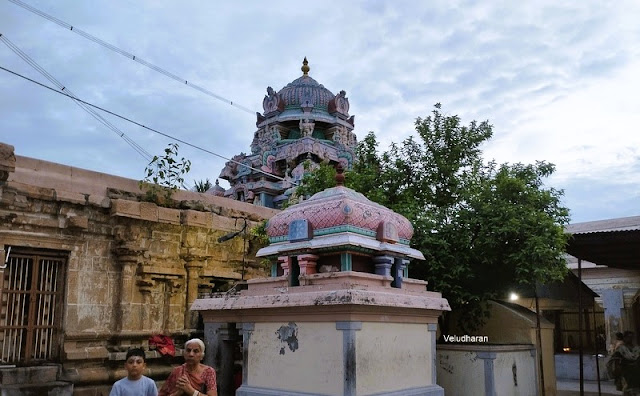









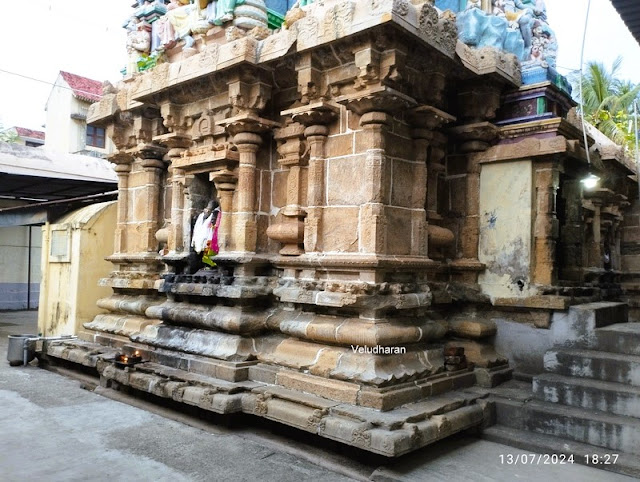







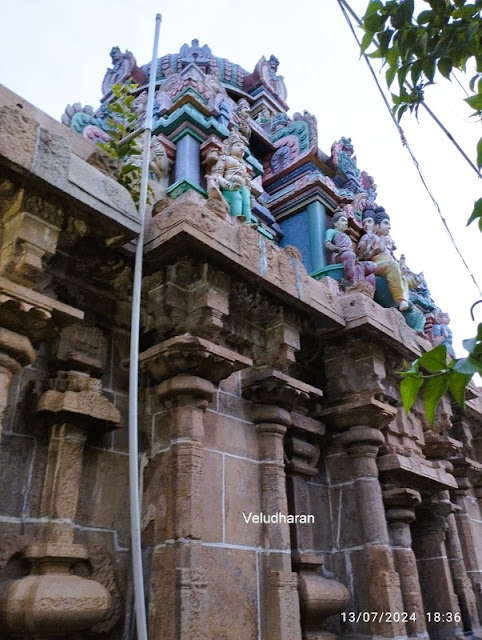
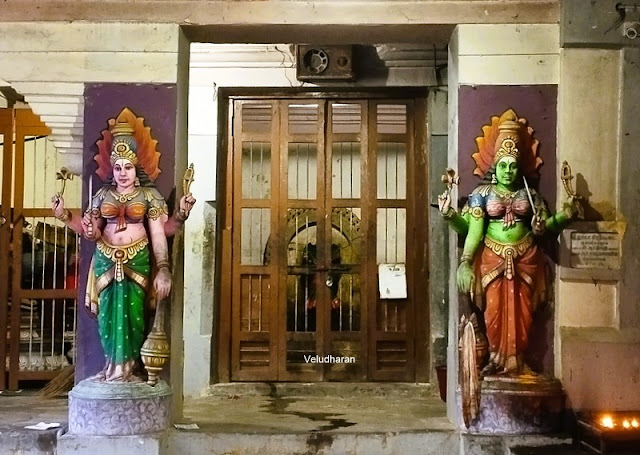


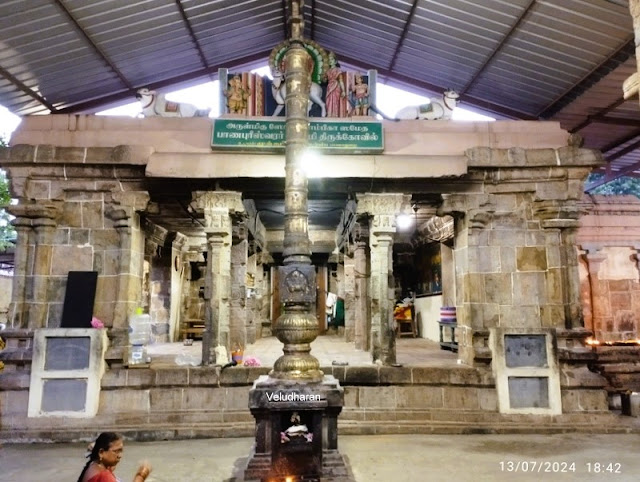
No comments:
Post a Comment